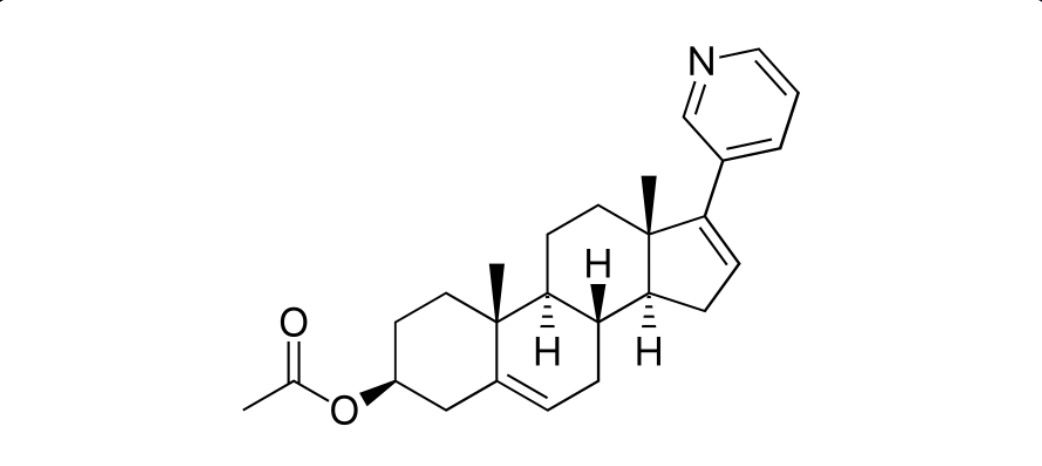Abiraterone acetate

Overview
Abiraterone Acetate is an oral androgen biosynthesis inhibitor that selectively inhibits CYP17, an enzyme critical for testosterone production in the testes, adrenal glands, and prostate tumor tissue. By reducing androgen levels, it slows the growth of prostate cancer, especially in metastatic castration-resistant and high-risk castration-sensitive cases. The drug is administered orally in combination with prednisone to mitigate mineralocorticoid excess. Clinical evidence demonstrates improvements in overall survival and progression-free survival. Abiraterone Acetate is widely used in advanced prostate cancer management, offering a non-chemotherapy oral option with a tolerable safety profile and significant patient benefits.
Background and Date of Approval
Abiraterone Acetate was developed as a next-generation androgen biosynthesis inhibitor to target advanced prostate cancer. The drug received FDA approval in 2011 for metastatic castration-resistant prostate cancer in combination with prednisone, following pivotal trials showing survival benefits over placebo. Subsequent approvals expanded its use to chemotherapy-naive patients and metastatic castration-sensitive prostate cancer in combination with androgen deprivation therapy. The European Medicines Agency and other regulatory bodies also recognize its efficacy and safety profile. The drug’s development marked a major advancement in targeted therapy for prostate cancer, offering a convenient oral alternative to conventional chemotherapy with proven clinical outcomes.
Uses
Abiraterone Acetate is indicated for metastatic castration-resistant prostate cancer and metastatic castration-sensitive prostate cancer when used alongside androgen deprivation therapy. It is administered in combination with low-dose prednisone to reduce the risk of mineralocorticoid-related adverse effects. Clinical studies have shown significant reductions in disease progression, improved survival, and symptomatic relief in patients. Abiraterone Acetate is effective in patients with both chemotherapy-naive and post-chemotherapy disease, providing a versatile treatment option across different stages of advanced prostate cancer.
Administration
Abiraterone Acetate is taken orally at a dose of 1,000 mg once daily, preferably on an empty stomach to optimize absorption. It must be administered with 5 mg of prednisone twice daily to counteract potential mineralocorticoid excess. Dose adjustments are recommended for patients with hepatic impairment. Regular monitoring of liver function, blood pressure, potassium levels, and fluid retention is essential to ensure safety and efficacy. Patients should avoid consuming food with the drug as it can significantly increase systemic exposure and the risk of toxicity.
Side Effects
Frequent side effects of Abiraterone Acetate include fatigue, joint swelling or discomfort, fluid retention, high blood pressure, hot flashes, diarrhea, and nausea. Some patients may experience mild liver enzyme elevations. Most adverse events are manageable with supportive care, dose modification, or concurrent prednisone therapy. Patients should be counseled to report persistent or severe symptoms promptly to their healthcare provider.
Warnings
Serious risks include hepatotoxicity, hypokalemia, hypertension, fluid retention, cardiac disorders, and adrenal insufficiency. Monitoring of liver function tests and electrolytes is critical, particularly during the initial months of therapy. Patients with severe hepatic impairment should avoid treatment, and those with pre-existing cardiac conditions require close monitoring. The drug is contraindicated in patients with hypersensitivity to Abiraterone Acetate or any of its excipients.
Precautions
Abiraterone Acetate is a strong CYP3A4 substrate and may interact with CYP2D6 substrates. Concomitant use with strong CYP3A4 inhibitors or inducers should be carefully managed. Patients with a history of cardiovascular disease, hypertension, or hypokalemia need close supervision. Liver function should be assessed prior to therapy initiation and periodically thereafter. Pregnancy and breastfeeding are contraindicated due to potential teratogenic effects.
Expert Tips
Ensure patients take Abiraterone Acetate on an empty stomach and adhere to the prednisone schedule to reduce side effects. Monitor liver function, potassium levels, blood pressure, and signs of fluid retention. Educate patients about symptoms of hypokalemia, hypertension, and liver toxicity. Pharmacists should counsel on proper storage, administration, and drug interaction risks. Coordination with oncology teams ensures optimal efficacy and patient safety, while providing guidance for adverse event management.
